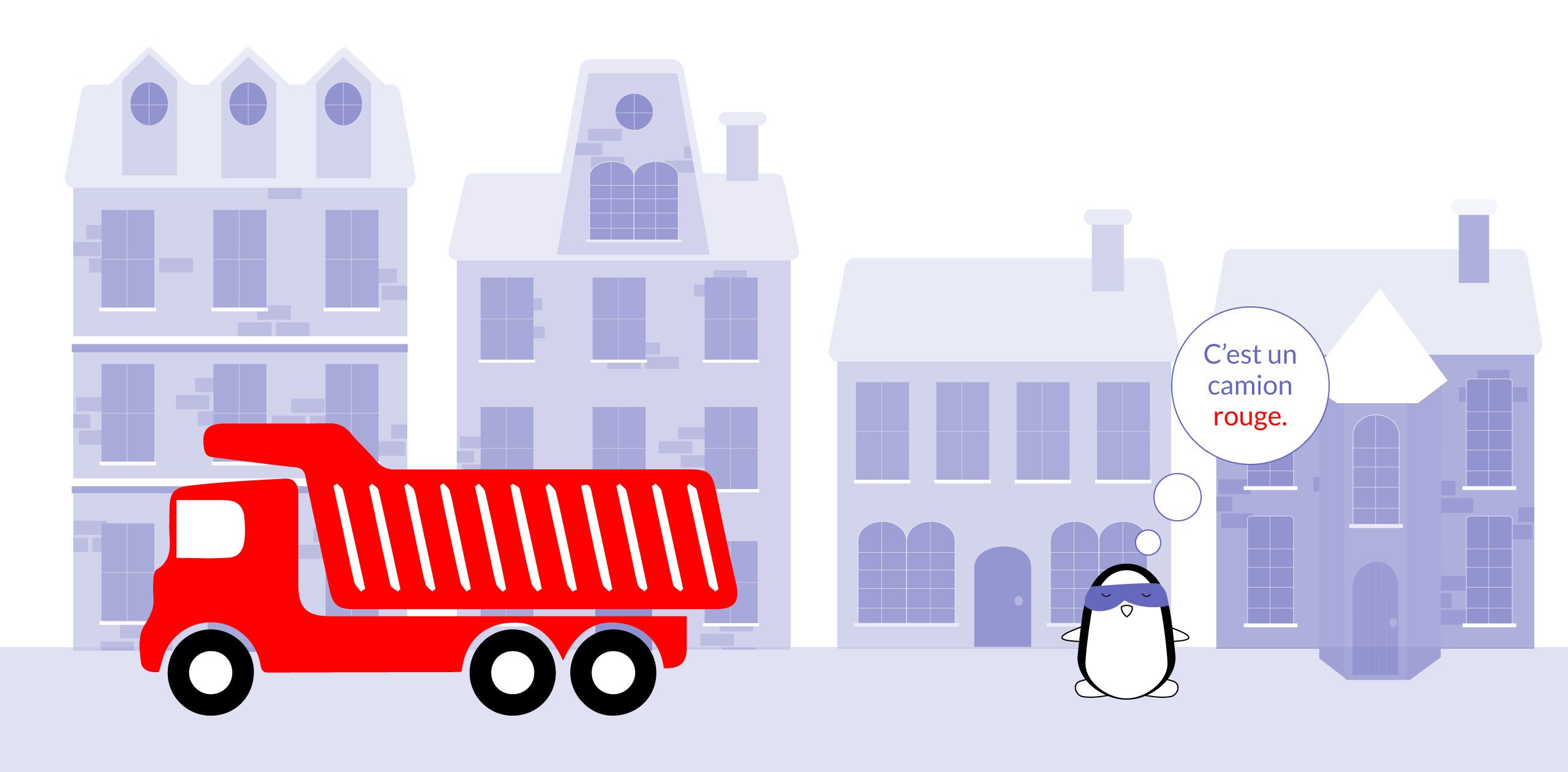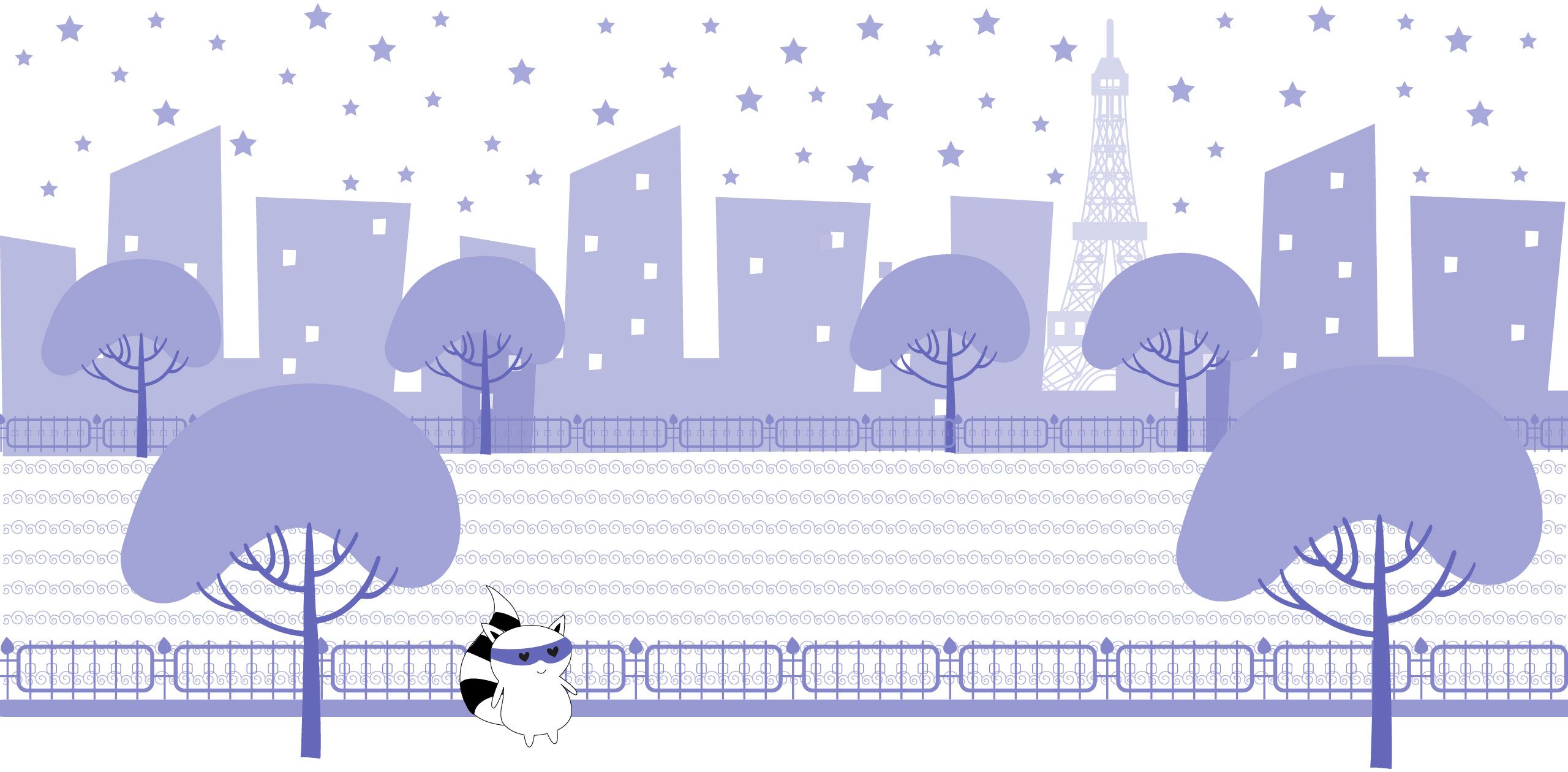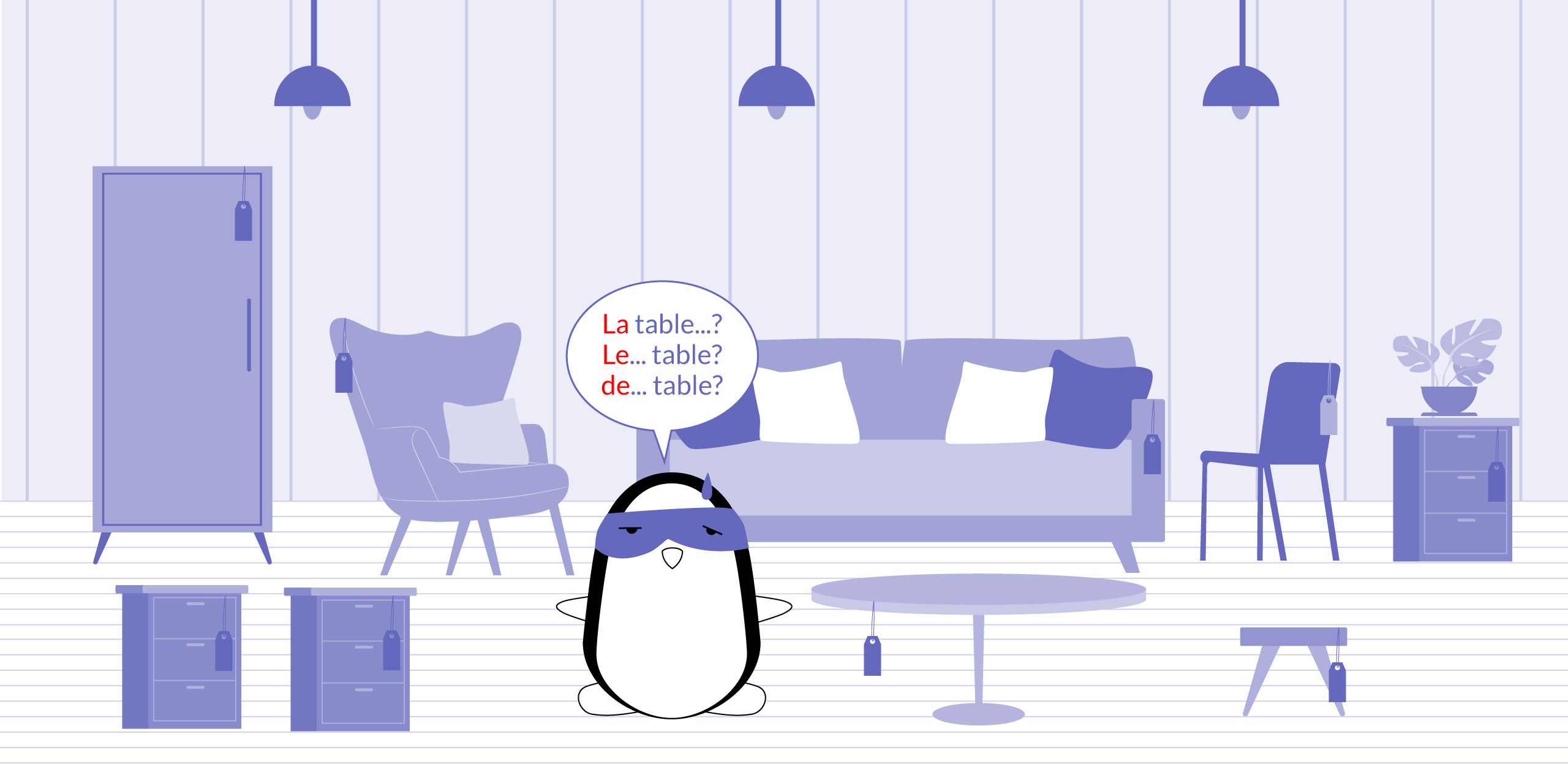
French grammar has quite a few challenging points, and articles are one of them. French articles can be definite, indefinite, partitive, masculine and feminine, contracted and not – it’s very easy to get lost when trying to tackle this topic. However, understanding how to use articles is an essential part of learning French grammar.
So let us teach you everything you need to know about French articles. In this post, we'll discuss the different types of articles, and then we'll go over the rules and exceptions for each one. By the end, you'll be able to understand which articles go where, and after some practice you’ll be able to use them like a pro. So, what are you waiting for? Read on.
Learn French with Langster
French Indefinite Articles
There are three indefinite articles in the French language:
French
English
un
masculine singular
une
feminine singular
des
plural
Both singular articles correspond to the English “a”. Des corresponds to the English article “some”. Just like in English, French indefinite articles are used to refer to something that is not specifically identified.
As you can see, the French indefinite articles agree with the gender and number of the noun they are modifying. Un is used for masculine nouns, une is used for feminine nouns, and des is used for plural nouns (both masculine and feminine). You will use a singular French indefinite article when:
- Talking about an unspecified person or thing:
French
English
J'achète un livre.
I’m buying a book.
Puis-je avoir un café?
Can I have a coffee, please?
- Referring just to one thing/portion of something.
French
English
J'ai une sœur.
I have one sister.
Je voudrais un café, s'il vous plaît.
I would like a coffee, please.
Use the plural indefinite article when there’s an unspecified number of things:
French
English
J'ai acheté des pommes.
I bought some apples.
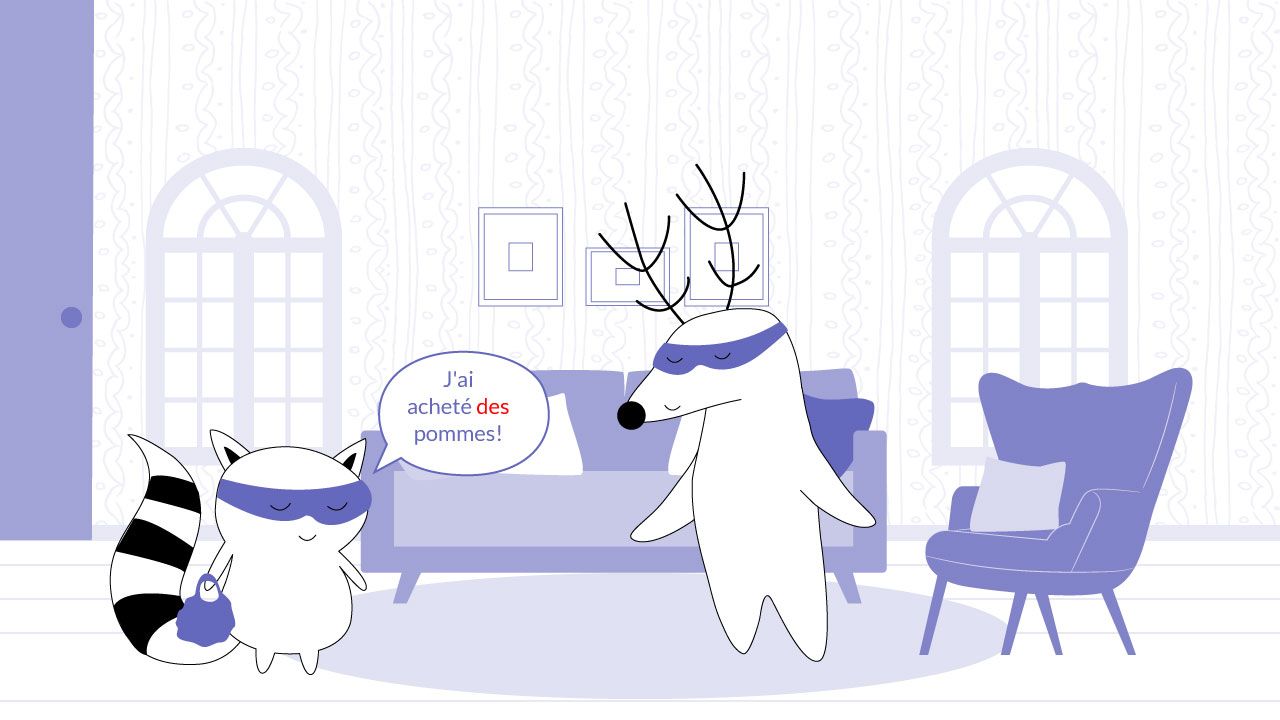
Exceptions
You don’t use an article when referring to a person’s profession or religion. This might be a little weird for native English speakers since in English, you talk about professions and religions using the article “a.”
French
English
Je suis médecin.
I am a doctor.
Elle est devenue bouddhiste.
She became a buddhist.
French indefinite articles are also not used in negative sentences. Instead, we change them to de, which means “(not) any.”
French
English
Il ne lit pas de livres.
He doesn't read any books.
French Definite Articles
There are four definite articles in French:
French
English
le
masculine singular
la
feminine singular
les
plural
l'
used in front of a vowel or silent h
They are used to indicate that the noun they are modifying is known to the speaker or is specific in some way – and corresponds to the English article “the.”
Just like with the indefinite articles, the French definite articles agree with the gender and number of the nouns they modify.
Here are some examples of when you would use a French definite article:
- When referring to a person or thing that has already been mentioned:
French
English
Je cherche un livre. Voilà le livre.
I'm looking for a book. Here is the book.
Avez-vous vu mes clés? Je ne les trouve pas.
Have you seen my keys? I can't find them.
- When referring to a person or thing that is unique:
French
English
C'est la seule chose à faire.
It's the only thing to do.
- When talking about something in a general sense (this is different from English, where you drop the article):
French
English
Les chiens sont des animaux fidèles.
Dogs are loyal animals.
C'est la vie!
That's life!
The French definite article l’ is used for words starting with a vowel or a silent h (h muet). It’s basically the article le or la shortened for the phrase to sound better. Remember, you don’t use it for plural nouns.
French
English
Avez-vous vu l'arbre dans notre jardin ?
Have you seen the tree in our garden?
Les arbres ont grandi encore plus cette année.
The trees grew even bigger this year.
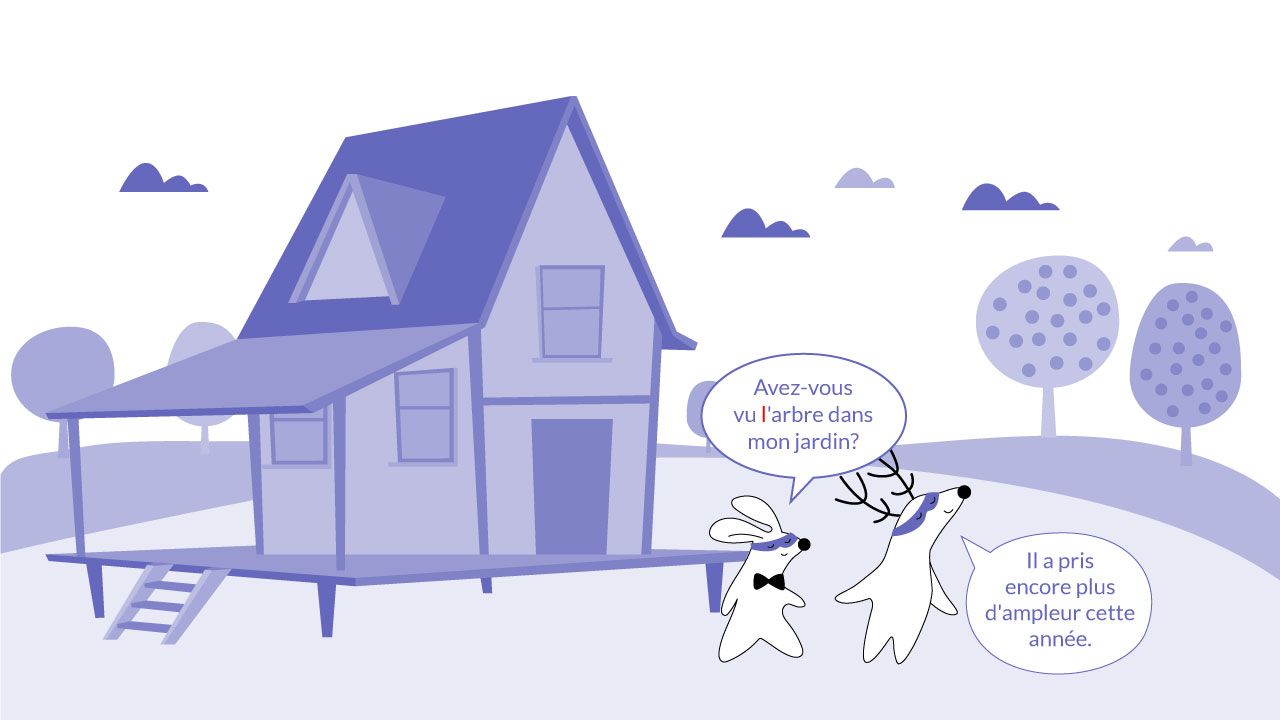
Definite Article Contractions
In French, the definite articles can be contracted with prepositions à (to) and de (of/from). Unlike English contractions which are optional, French contraction of the article is obligatory.
Here’s a quick overview:
À + Definite articles
When the preposition à and the definite article le are next to each other, they become au.
French
English
Je vais aller au cinéma demain.
I will go to the cinema tomorrow.
The same happens with the plural definite article les that follows the preposition à: it becomes aux.
French
English
J'ai donné le livre aux camarades de classe.
I gave the book to the classmates.
However, when the definite article la or l’ comes after the preposition à, they are not contracted.
French
English
Allons à la bibliothèque ensemble.
Let's go to the library together.
J'ai donné ce CD à l'homme que je connais.
I gave this CD to the man I know.

De + Definite articles
The same happens to the definite articles that follow the preposition de. Le, combined with de, becomes du, and les + de = des.
French
English
Je suis rentré du salon.
I returned home from the salon.
Parlons des maisons que vous voulez acheter.
Let's talk about the houses you want to buy.
Just like with the preposition à, you don’t contract French definite articles la and l’ with de.
French
English
Je mange de la confiture au petit-déjeuner.
I eat jam for breakfast.
Il adore mettre de l'huile d'olive sur tout.
He loves adding olive oil to everything.
French Partitive Articles
Partitive articles are used to indicate that the quantity of the noun they are modifying is unknown or unspecified. They correspond to the English "some" or "any".
There are four partitive articles in French:
French
English
du
masculine singular
de la
feminine singular
des
plural
de l’
used in front of a vowel or silent h
In English, partitive articles are often omitted, while in French, people use them all the time. You need to place a partitive article in front of a noun when talking about an unknown quantity of something, usually food or drinks:
French
English
Avez-vous de la farine ?
Do you have (any) flour?
Je voudrais du lait avec mes biscuits.
I would like (some) milk with my cookies.
- When using adverbs of quantity with a noun, change the partitive article to de:
French
English
J'ai un paquet de farine, combien en avez-vous besoin ?
I have a bundle of flour, how much do you need?
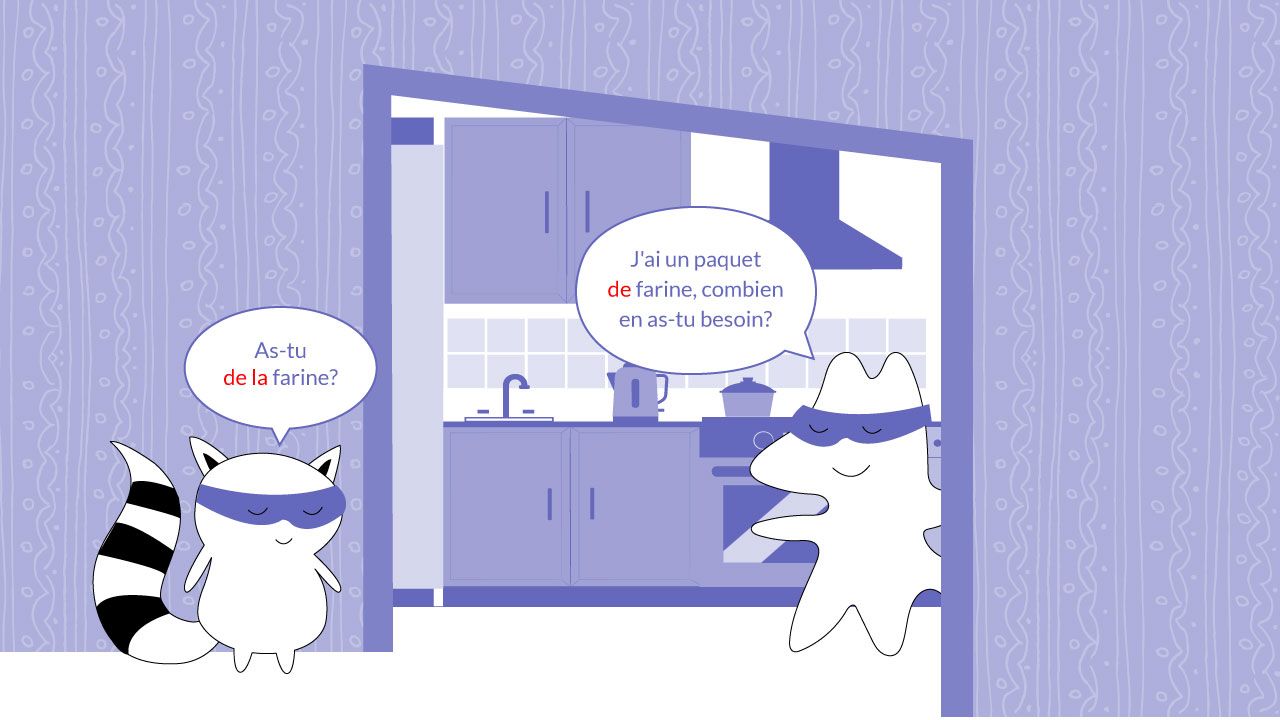
- In negative constructions, also change the partitive article to de:
French
English
Malheureusement, nous n'avons pas de lait pour le moment.
Unfortunately, we don't have any milk at the moment.
The Issue of Gender in French Grammar
English doesn’t have grammatical gender – the gender of a noun is simply the gender of the object it represents. For example, “chair” is a feminine word, but it doesn’t make the object itself (a chair) ladylike. In English all objects are neutral.
In French, on the other hand, all nouns are assigned a grammatical gender – masculine or feminine. This can be confusing for beginners, and using different French articles can become a challenging issue. Luckily there are some patterns that you can learn to help you guess the gender of a noun.
Here are some general rules about French grammatical gender:
- Nouns ending in -e are usually feminine: la table, la lampe, la chaise.
- Nouns ending in -tion, -sion, -xion are usually feminine: la situation, la television, la fusion.
- Nouns ending in -ité, -té are usually feminine: l'individualité, la sincérité.
- Nouns ending in -ance, -ence are usually feminine: l'importance, la conscience.
- Nouns ending in -age, -ège are usually masculine: le voyage, le ravage.
- Nouns ending in -isme are usually masculine: le capitalism, le racism.
- Nouns ending in -eau, -eu are usually masculine: le bateau, le chapeau.
- Nouns ending in -ou are usually masculine: le tournoi, le jupon.
Of course, there are always exceptions to the rules. Because of that, the best way to learn the gender of the noun is to memorize the word with the corresponding article: for example, un livre. Another good idea is to create flashcards or practice using new words in real-life contexts: Vous avez vu mon livre ?
When in doubt, you can also look up the word in a dictionary – most of them list the gender (and, accordingly, article) of the nouns.
Final Notes on French Articles
If you're looking to become fluent in French, it's important to practice your grammar skills. Learning the different articles and their usage can be tricky, but with enough practice, you'll be speaking like a native in no time. We've given you some general rules to help get you started, but remember that there are always exceptions to every rule.
The best way to learn French articles is by practicing regularly and consistently. Download a language learning app, use flashcards, or do some exercises on the topic – don’t stop after reading this article. With a little bit of effort, soon you'll be able to navigate French articles with ease!








